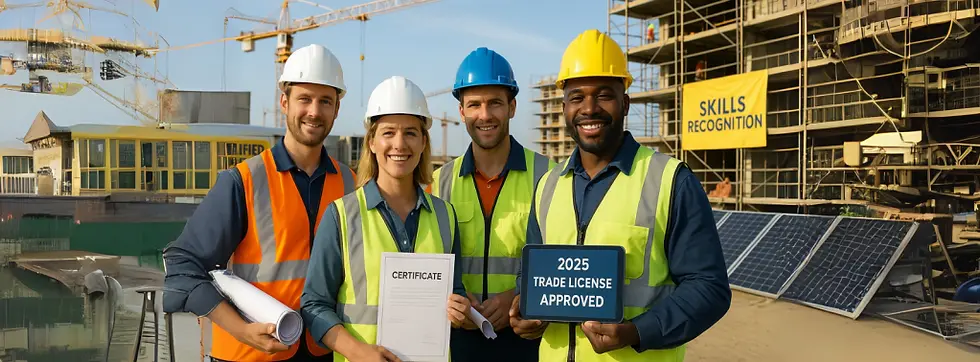How to Follow Up After a Job Interview Without Sounding Pushy
- Adrienna Clarke

- 5 days ago
- 6 min read

Landing a job interview is a significant achievement in itself, but the process doesn’t end once you walk out of the interview room. In today’s competitive job market, following up after a job interview is just as important as preparing for the interview itself. However, finding the right balance between showing interest and not coming across as pushy can be a tricky line to walk. You want to demonstrate your enthusiasm for the role, but you also want to avoid being overbearing.
So, how do you follow up after a job interview without sounding desperate or intrusive? In this blog, we’ll cover effective strategies and best practices that can help you navigate this delicate phase of the job application process with grace and professionalism.
Timing is Key: When to Follow Up
The timing of your follow-up is one of the most crucial aspects. Reach out too soon, and it might seem like you're rushing or desperate for an answer. Wait too long, and you risk losing momentum or seeming disengaged.
After the interview, it’s generally a good idea to send a thank-you note within 24 to 48 hours. This gives the interviewer time to process the interview, but it also ensures that you remain fresh in their mind. A quick, polite thank-you note shows you appreciate the opportunity to interview and can set you apart from other candidates.
However, if the employer gave you a specific timeframe for when they plan to make a decision, respect that timeline. For example, if they say they’ll be in touch within a week, follow up a few days after that period has passed.
Crafting the Perfect Thank-You Email
A thank-you email is a powerful tool for following up after an interview. It’s a chance to reiterate your interest in the role and leave a lasting positive impression. The key is to keep the tone professional, genuine, and concise.
Start with Gratitude
The first thing you want to do is thank the interviewer for their time and the opportunity to discuss the role. Even if the interview didn’t go as smoothly as you had hoped, a gracious thank-you is always appreciated.
For example, you could say: “Thank you for taking the time to meet with me today. I thoroughly enjoyed our conversation and learning more about the exciting projects your team is working on.”
Highlight Your Enthusiasm
In your follow-up email, make sure to express your continued enthusiasm for the position. It’s important that you remind the interviewer why you’re excited about the opportunity and how your skills and experience align with the company’s needs.
An example could be: “I’m even more excited about the opportunity to join your team and contribute to [specific project or initiative discussed in the interview]. My experience in [specific skill or field] would enable me to make an immediate impact, and I am eager to bring my passion for [industry or role] to your company.”
Reiterate Your Fit for the Role
Reaffirm why you believe you’re the right candidate for the role. This is your chance to subtly highlight your qualifications and demonstrate your value without sounding overly pushy. You can mention a key aspect of the role that aligns with your skills or a challenge discussed in the interview that you’re excited to tackle.
For example: “As we discussed, my background in [relevant experience or skills] aligns perfectly with the key requirements for this position. I’m confident that my experience in [related skill] will allow me to contribute effectively to your team and help achieve your company’s goals.”
Close Politely with an Invitation for Next Steps
Your thank-you email should include a polite, open-ended statement about looking forward to next steps. Avoid sounding like you're demanding an immediate response, but instead, express your eagerness to continue the conversation. A simple closing sentence like, “I look forward to hearing from you about the next steps in the process” or “Please don’t hesitate to reach out if you need any further information” is ideal.
Handling the Waiting Period: When to Check In
After sending your thank-you note, you may enter the dreaded waiting period. This is where patience is key. During this time, it’s important to resist the urge to constantly check your email or bombard the interviewer with follow-up messages.
If you haven’t heard back by the timeframe the interviewer gave you (or after a week or so has passed if no timeframe was mentioned), it’s perfectly acceptable to send a polite follow-up email. This email should be brief, courteous, and non-intrusive. The goal is to show that you’re still interested in the position without being pushy.
Here’s an example of a well-crafted follow-up email:
“Dear [Interviewer’s Name],
I hope you’re doing well. I wanted to check in and see if there were any updates regarding the [position title] role I interviewed for on [date]. I remain very enthusiastic about the opportunity to join your team and contribute to [specific project or goal discussed in the interview]. Please let me know if there’s any further information you need from me.
Thank you again for your time, and I look forward to hearing from you.
Best regards,[Your Name]”
Don’t Overdo It
One follow-up email is typically enough. If you don’t hear back after your polite follow-up, it’s important to respect the employer’s decision and timeline. Constantly sending follow-ups will only risk annoying the hiring manager and potentially damaging your chances of being considered for the role.
When to Follow Up After Multiple Rounds of Interviews
In some cases, interviews for a particular role may involve several rounds of interviews. If this is the case, it’s important to continue following up after each interview round. However, each follow-up should be tailored to the stage of the interview process.
For example, after the first interview, you may want to thank the interviewer for the opportunity to discuss the role and express your continued interest. After the second interview, you might want to reference specific details from the second conversation that solidified your enthusiasm for the role. The more you progress in the interview stages, the more personalised and specific your follow-up emails should be.
If you haven’t received any updates after your final interview, you can send a final follow-up email to thank the interviewers for their time and inquire about the decision timeline.
The Fine Line: Being Persistent vs. Being Pushy
When following up after an interview, it’s essential to find the right balance between persistence and patience. Being persistent shows you’re enthusiastic, but being too pushy can be off-putting. Here are some signs you may be crossing the line into pushiness:
Constantly following up: If you send multiple follow-up emails or reach out repeatedly in a short period, it can seem like you're desperate for an answer.
Demanding a response: Always approach follow-ups with politeness and respect for the interviewer’s time.
Expressing frustration: If you’re frustrated by the wait or lack of communication, avoid expressing these emotions in your emails. Keep your tone positive and professional.
What If You Don’t Hear Back?
It’s important to accept that not every job application will result in an offer. Sometimes, despite your best efforts, you may not receive a response. In these cases, try to view the experience as a learning opportunity. Ask for feedback (if appropriate), and use it to improve your performance for future interviews.
If you still don’t hear back after a polite follow-up email, it’s okay to move on. Keep applying to new opportunities and remember that each interview brings you one step closer to your ideal job.
Conclusion
Following up after a job interview is a fine art. It’s an opportunity to reinforce your enthusiasm for the role, demonstrate professionalism, and keep your name fresh in the employer’s mind. By timing your follow-ups appropriately, crafting thoughtful thank-you emails, and respecting the employer’s decision-making process, you can follow up without sounding pushy.
Remember, patience is key, and persistence is a virtue — but only when done in moderation. By staying courteous, professional, and respectful throughout the process, you’ll not only increase your chances of securing the job but also leave a lasting positive impression. Happy job hunting!
If you’d like personalised support—whether it’s professional Resume and Cover Letter writing, FIFO Resume, Employer Sponsorship Resumes and Cover Letters, SEEK and LinkedIn profile optimisation, Selection Criteria for Government Jobs, one-on-one Job Interview Coaching or Other Professional Writing Services —please feel free to call us on 0423 686 904 or email us at hello@adriennasresumes.com





















